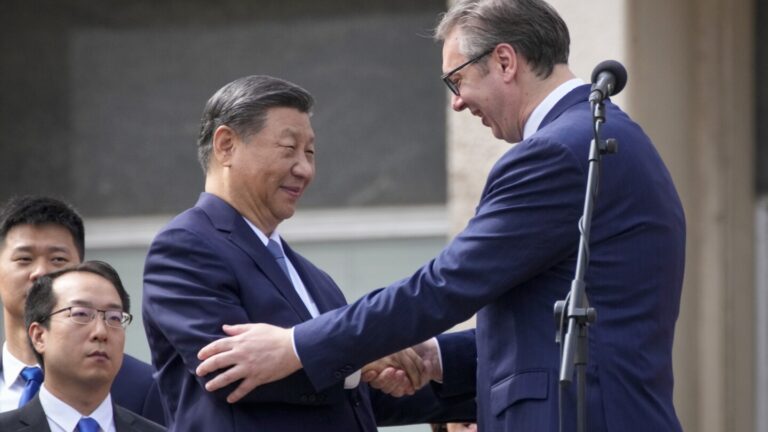BELGRADE, Serbia (AP) — China and European Union candidate Serbia signed an agreement Wednesday to build a “common future,” making the Balkan country the first in Europe to sign such a document with China. The country has come to an agreement.
After their meeting in Belgrade, Chinese President Xi Jinping and Serbian President Aleksandar Vučić said that they would “deepen and enhance the comprehensive strategic partnership between China and Serbia” and that “China and Serbia will build a new community with a shared destiny.” Build an era.”
Mr. Xi started using the term “community with a shared future” more than a decade ago. While this may not refer to a specific initiative, experts believe it has fundamental meaning as another term for alliances.
“Eight years ago, Serbia became China’s first comprehensive strategic partner in the Central and Eastern European region.And today, Serbia has become the first European country to build a community of common destiny with China, It fully reflects the special and high level of the agreement,” President Xi said at a press conference after signing the agreement.
Vučić said the two countries are “moving away from the strategic relationship that has enhanced our relationship to a common future for both countries.”
“This is the best possible form of cooperation between our two countries and I am proud to have signed it today as President of Serbia,” he added.
It was not immediately clear how the EU would react to Serbia moving ever closer to China. Due to Russia’s war against Ukraine, the integration of the six countries in the Western Balkans, including Serbia, into the EU has become a top priority for the 27-nation bloc.
Gabriel Escobar, the US special envoy for the Western Balkans, said President Xi’s first trip to Europe in five years was aimed at driving a wedge between European countries.
“We caution all partners and interlocutors to be fully aware of China’s aims in Europe and with respect to the European Community,” he said in an online press conference.
China claims neutrality in the Ukraine conflict, but refuses to call the Russian attack an invasion and has been accused of building up Russia’s military power. Serbia has condemned Russian aggression but has refused to join international sanctions against Moscow.
President Xi arrived in Serbia on Tuesday evening to a warm welcome from France, where he held talks. High-stakes state visit ruled by trade dispute and of russia war in ukraine.
On Wednesday, thousands of people chanting “China-Serbia” and waving flags from all over Serbia attended a welcoming ceremony for President Xi in front of the Serbian Palace in Belgrade’s New District, where the talks were held. came by bus.
Serbia’s populist president addressed the crowd from the balcony, calling Mr Xi an “ironclad” friend. The prime minister said his visit to Serbia was “historic” as it paves the way for even closer ties.
“It may not seem like it to many people, but we are writing history today,” Vučić said. “Thank you President Xi. He hasn’t been to Europe for five years now, but he chose our little Serbia again.”
“We have witnessed firsthand that the Serbian people regard the Chinese as their ironclad best friends,” Xi said at the beginning of Wednesday’s official talks.
“This is truly a two-sided and true friendship…I sincerely admire it and it left a very deep impression on me,” Xi said, according to state-run RTS television.
President Xi will visit Hungary later on Wednesday. Like Serbia, Hungary is considered one of China’s friendlier partners in Europe.
Signs of pro-China sentiment were visible throughout the Serbian capital. A huge Chinese flag was hoisted on a high-rise building along the road leading from the airport into the city. Small Chinese and Serbian flags could be seen downtown and along the highways.
China has poured billions of dollars into investments and loans to Serbia, particularly in the mining and infrastructure sectors. The two countries signed a strategic partnership agreement in 2016 and a free trade agreement last year.
Some agreements, such as free trade agreements, are not consistent with the terms of EU membership. Serbia wants to officially join the 27-nation bloc, but it is gradually moving away from that path.
Serbia is a landlocked country located in the center of the Balkan Peninsula and is an important country for China. One Belt One Road Initiative The aim is to increase the Chinese government’s influence in Europe through economic investment. Critics say it could become a Chinese Trojan horse or a gateway to Europe.
President Xi arrived in Serbia on a symbolic day. It was the 25th anniversary of the bombing of the Chinese embassy in Belgrade by US military planes during the NATO air campaign against Kosovo, killing three Chinese nationals.
This incident helped forge close political ties between China and Serbia.
Chinese companies operate Serbia’s largest copper mines and steel mills, and are also building numerous roads and highways across Serbia, as well as railways to neighboring Hungary to the north.
2014, Hungary and Serbia signed an agreement with Beijing Modernizing the railway between the capital Budapest and Belgrade is part of the Belgrade and Road Initiative, which links the country to the Chinese-controlled port of Piraeus in Greece in the south, which is the gateway for Chinese goods to Central and Eastern Europe.
The more than $2 billion project is scheduled to be completed in 2026 after repeated delays.
In 2022, immediately after Russia invades Ukraine, Serbia Semi-secret delivery An example of China’s sophisticated anti-aircraft system installed on a Chinese Air Force Y-20 transport aircraft.
The arms deliveries on the territory of at least two NATO members, Turkey and Bulgaria, are seen by experts as a sign of China’s growing global influence.
___
Contributions were made by Wanquing Chen and Ken Mortsugu in Beijing, China, and LLazar Semini in Tirana, Albania.

